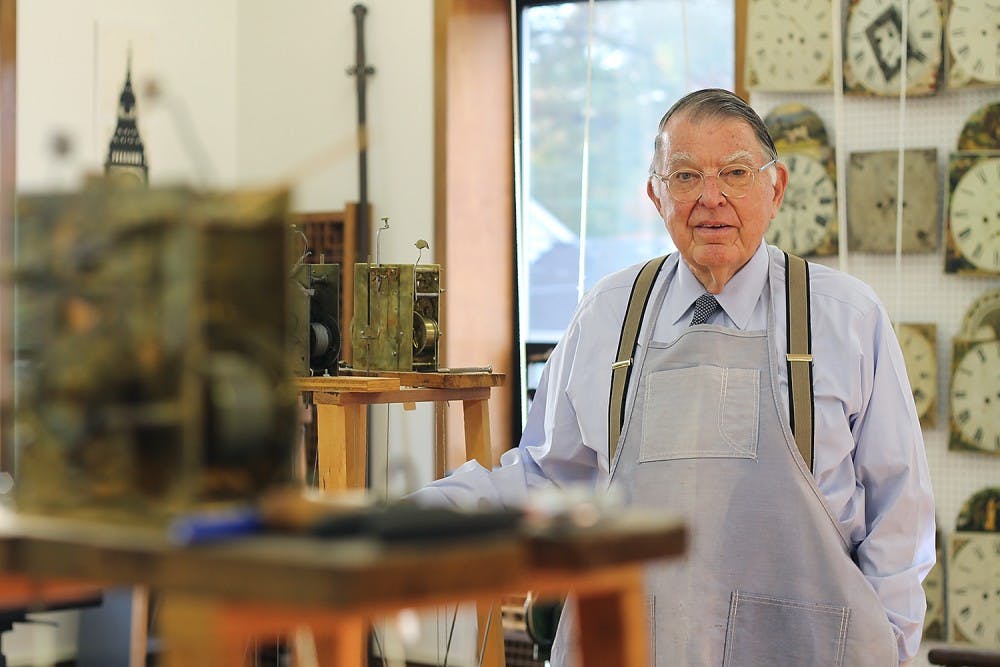“The General Assembly shall provide that the benefits of the University of North Carolina and other public institutions of higher education, as far as practicable, be extended to the people of the state free of expense,” Spangler easily recites from memory.
He lingers on the word “extended.”
“It says ‘extended,’” he said. “It does not say offered or made available. Extended — that’s an active verb. Anybody who studies the English language can see the person who wrote that understood exactly what he was talking about.”
In August, the Board of Governors swiftly approved a measure that said UNC-system schools will no longer be allowed to use more than 15 percent of their tuition revenue for need-based financial aid beginning in 2015.
“I felt quite comfortable with the need-based tuition,” Spangler said. “You can argue either side. In some ways, if you’re giving one person an advantage then you’re taking away from someone else.”
UNC-CH exceeds the 15 percent threshold by 5.9 percent — more than $19 million above the cap. The measure does not dictate that schools recede to the 15 percent level — instead, it freezes the amount of tuition going toward aid. Going forward, the University is only permitted to use its current budgeted amount of $67.5 million to support need-based aid.
“Of all the things I felt strongly about when I was there it was accessibility — and not just at a reasonable price,” Spangler said. “(The constitution) doesn’t say anything about comparing yourself to UVa. or Berkeley or Cal Tech or Michigan.”
Chancellor Carol Folt has promised UNC-CH will continue to meet 100 percent of its students’ demonstrated need.
In an interview with The Daily Tar Heel’s editorial board earlier this year, Folt said the University is looking at raising an endowment that will protect programs like the Covenant Scholars program in perpetuity.
That endowment would have to total about $100 million to preserve need-based aid in its current state — a huge endeavor for a University that’s already bracing for more budget cuts in the coming academic years.
On whether affordability is something the University must work to preserve, Spangler weighed in with a brief response.
“It’s the most important item,” he said.
To get the day's news and headlines in your inbox each morning, sign up for our email newsletters.
See, Spangler has a sureness about him that doesn’t relent. The Wainstein report — which detailed the bogus classes athletes took for 20 years to help them maintain eligibility — brought the University to its knees. But not Dick Spangler.
It was an embarrassing day for the University. At the time, President Tom Ross, who commissioned independent investigator Kenneth Wainstein to compile the report, said he looked forward to the University beginning to make the necessary changes it needed and move on.
But Spangler can’t be made to feel ashamed of his University in any way.
“I was there for 11 years and I worried about it every single day,” Spangler said. “It’s a situation where the television money is a ruling factor. And nobody could be proud of that. It’s embarrassing, but it’s not a basic concern for me because I think the academics of Chapel Hill are still very close to being perfect.”
Even when confronted with evidence of two decades of academic misconduct, Spangler has an answer.
“This is not what 28,000 students are doing on that campus,” he said. “It’s embarrassing to have these revelations, and I prefer them not being there. It is a red flag for the president and the chancellor and the others in authority to make sure these students actually go to class. If they go to class, it’s likely they will learn something.”
Spangler knows a lot about going to class. During his tenure as president of the UNC system, Spangler would often sneak into classes at UNC-CH hoping to learn from the professors he was constantly defending.
A favorite class was a Shakespeare course taught by Professor Darryl Gless, who died in June, after a long battle with a marrow disorder.
“One day (Gless) said, ‘Will you teach Julius Caesar?’” Spangler said, smiling as he remembered his friend.
So the next week, the class had Julius Caesar taught by the UNC-system president.
That’s Dick Spangler. A man who can rattle off memories of teaching a class at his alma mater but won’t tout his degrees from Harvard. He says he wants the people of North Carolina to know his commitment to them.
“I think of all of North Carolina as my home — I’m going to my mountain home in Linville this afternoon,” he said, checking the clock on his iPhone to make sure he wouldn’t be late for his wife Meredith.
But how couldn’t people know his love for this state? It’s people?
He went 11 years leading the University system, which had its budget double under his leadership, without ever accepting pay.
Before that, he was chairman of the State Board of Education after he oversaw the integration of public schools while on the Charlotte-Mecklenburg school board. More recently, his philanthropic foundation has endowed dozens of professorships in the UNC system.
“My going back to Chapel Hill is just like when you go back,” he said.
“You’ll miss some of your students and you’ll miss not being editor of The Daily Tar Heel. There will be a time when no one will remember you as the editor of The Daily Tar Heel unless you go out and do something either stupendously brave or dumb.”
The man who had every opportunity to go anywhere chose to stay in the one place where he learned everything he needed to know.
And, to a 21-year-old aspiring journalist who has hopes of heading to New York City after she graduates, he had just one thing to say.
“Oh, that’s okay. You’ll always find your way back home.”



